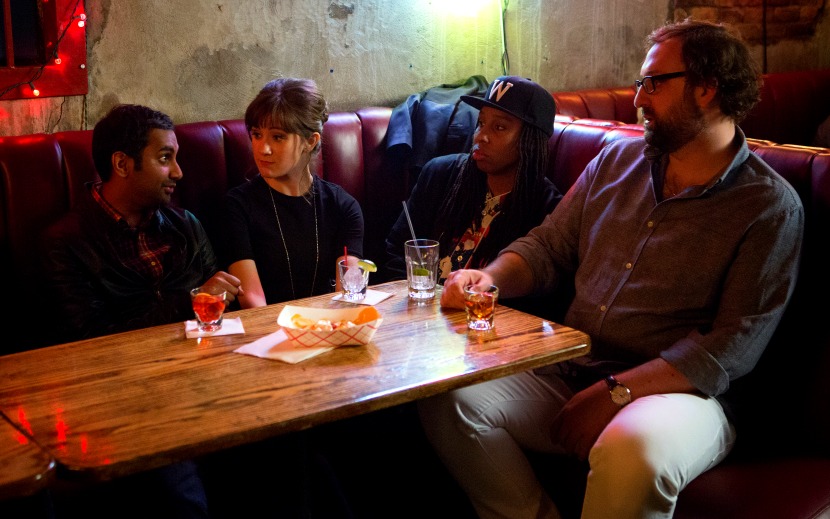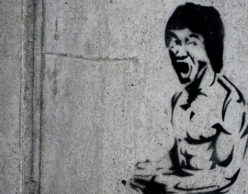5 Ways in Which Master of None Nails the First-Gen American Experience

Hey Mash-Ups, wouldn’t it be great if there was a show that held up a mirror to our lives? That centered around a group of diverse friends, that tugs at the complex dynamic with our immigrant parents and makes subtle reference to our ingrained customs? Wait, what? It exists? Oh yeah, the brilliance that is Master of None. Here, Megha Ralapati lists five ways in which the series perfectly captures our cultural mashiness. Here’s hoping for a second season!
Growing up as a first-generation Indian-American in a football-centric, blond-highlighted community in the Midwest, it took a while for me to understand my relationship to my culture. It was certainly different from the way it was depicted on TV. So you can imagine how thrilling it was to see the breakthrough of Aziz Ansari, a person who is proud of being Indian-American and who actively tries to develop a genuine understanding of his identity. And he, like the rest of us, struggles with it from time to time.
Nowhere is this more artfully captured than in Aziz’s semi-autobiographical Netflix series, Master of None. The comic has been diving into themes of romance, dating and what marriage means in different cultures. (He even legit collaborated with an actual sociologist for his book, Modern Romance.) The show, no surprise, nails it. It’s earnest and refreshing in its nuanced portrayal of contemporary life for many first-gen Americans who navigate career, love and an evolving relationship to their cultures. It’s such a huge relief to see myself reflected!
I have long been a fan of Aziz — not only for his breakout role on NBC’s Parks and Recreation — but for the sweet way he describes his chubby cousin Harris to his attempt to speak Tamil to rapper MIA to the way his comedy has evolved into dissecting Tinder and Hinge and how messed up dating and texting is. Now, I have another reason to be a fan: Master of None is speaking truth about our experiences as first-generation Americans.
Here is my list of the five ways in which Master of None gets it right for us kids of immigrants:
1. Respect for our parents runs deep. Also: Guilt.
Who hasn’t taken for granted the sacrifices made by our parents to provide for us in this country? Yet we repay them by rolling our eyes at their technological shortcomings or blowing off that weekly phone call. The episode, “Parents,” reflects this reality in a humorous and deeply touching way. Dev (Ansari) and his Taiwanese-American friend Brian (Kelvin Yu) — both privileged, first-generation Americans — are reluctant to make time for their immigrant fathers, whether it’s teaching them how to use an iPad or reading that recommended Economist article.
But as two flashback vignettes (beautifully directed by Ansari) show, coming to America to seek a better future was no walk in the park for our hardworking parents.
Dev’s father (played by Ansari’s real-life dad Shoukath Ansari) comes to the U.S. to train as a doctor and earn money to be able to provide his son with things like his own computer. His parents literally sacrificed everything and Dev can’t even find the time to call them.
His parents literally sacrificed everything and Dev can’t even find the time to call them.
We all know that guilt. And while we may get occasionally frustrated by our parents’ quirks – because we are humans – it feels so real to acknowledge that there’s understanding and redemption. Dev and Brian eventually both make an effort to connect with their parents, include them in their lives and respect and rejoice in their company. It’s something we all eventually discover: our parents are amazingly interesting, awesome and often hilarious people as a result of the trials and tribulations (and racist run-ins) they faced as immigrants, and they’re stronger because of it. Oh, and so are we.
2. We keep our dating life under wraps.
When you grew up hearing such things as boys turn into werewolves at night (thanks, Dad) or to just avoid them altogether, you’re going to tread a little carefully introducing your S.O. to the parents — even in adulthood. So when Dev’s girlfriend Rachel is distressed that he still hasn’t told his parents about their relationship even after a year of dating, I couldn’t help but sympathize … with him.
I completely understood Dev’s reluctance to introduce “just anyone” to his parents. (See above about the respect thing.) The “American” concept of dating always felt to me like an exam for a class I missed — and that was taught in another language. Bridging that divide with a partner of another culture is, in a way, like learning a new dialect.
The “American” concept of dating always felt to me like an exam for a class I missed — and that was taught in another language.
All throughout college, my Asian-American friends were perpetually dating people under their parents’ radar, testing out relationships and only introducing those partners they deemed serious enough to their families around graduation. In most cases, the parents were quite thrilled to be let in on a secret they probably already knew about. When Dev finally does introduce Rachel to his parents, they themselves are disappointed to have been excluded from such an important facet of their son’s life. As first-gens, we often think the news of our romantic lives is worse for our parents than it actually is. They are cooler than we give them credit for!
3. Gift-giving: it’s not just for the holidays.
When Dev’s parents finally meet Rachel, they not only don’t reject her, they present her with a necklace — a small token to demonstrate their respect and acknowledgement of her role in Dev’s life. I found this so moving. It’s a subtle, touching scene and felt like a shout-out to one of my favorite elements of Indian culture. We give gifts on any occasion, to anyone we want to make feel special. Indian events, weddings or bridal showers are occasions where the host herself gives gifts of sweets, sets of bangles or even silver to the guests in appreciation of their attendance and well-wishes.
It’s our way of saying, thanks, and welcome.
4. Say my name — it’s RUH-vee, not RAH-vee.
We’ve got creative aspirations, too, and our names might not all be the garden variety type. So when an entire episode is devoted to the professional struggle faced by Dev, Ravi and Anuj — all non-white actors trying to find a role that doesn’t reinforce a cultural stereotype — it strikes a chord.
Dev and his friend Ravi (played by a very funny Ravi Patel) are pitted against each other when auditioning for a part on a new sitcom. Yet the studio will choose only one of them because the execs are reluctant to cast two Indian characters on the same show. In addition to presenting what is probably a genuine conflict faced by Indian (and other non-white) actors today (take the stereotypical role or reject it on principle?) the show ameliorates this struggle by simply fixing what it aims to critique: the dearth of multi-dimensional Indian American characters. Hearing the names Hemant, Prashant, Ravi and Anuj pronounced proudly and correctly was like music to my ears.
Hearing the names Hemant, Prashant, Ravi and Anuj pronounced proudly and correctly was like music to my ears.
5. We can have a token white friend, too.
I love that Dev’s crew of friends is diverse and played by an array of multi-ethnic actors. Kind of like real life! What a shocker! In fact, the only white members of the central crew are Dev’s girlfriend Rachel and his giant buddy Arnold. Aziz joked on The Tonight Show that Arnold is Dev’s “token white friend.” On mainstream television, non-white actors show up as the tokenized outliers who neatly and improbably fit into a group of all-white friends. The thing is, this series doesn’t feel like a Benetton ad come to life, in which Dev’s friends are diverse for the sake of representation. I found the friendship between Dev and his Black, lesbian pal Denise (the to-die-for Lena Waithe) particularly real and funny as they discuss their fraught love lives and banter about food. In our circle of friends, we can create the world we’d like to live in. You guys in?
Feeling Master of None withdrawal? These links should help.
Maria Hinojosa on Telling America’s Stories, Yours Included
Be Less Racist: 12 Tips for White Dudes, by a White Dude
An Immigration Story: From Calabria to Cleveland
We’ll be your second home. Sign up for our newsletter!





